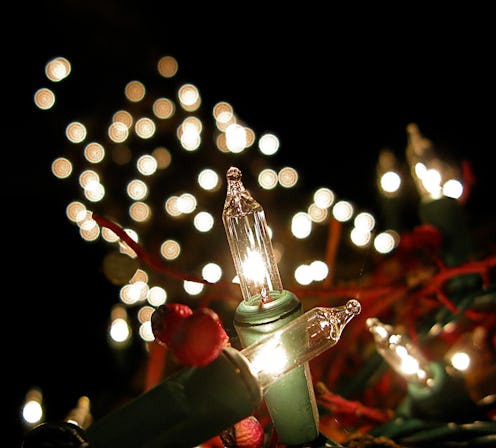
'Tis the season to sing "Jingle Bells" at the top of your lungs, lace your house with tons of tinsel, and string the kind of ostentatious light display that would make Clark Griswold shed tears of joy. But ever since UK communications regulator Ofcom revealed the latter could be affecting Wi-Fi connections, I haven't been able to stop wondering: Do holiday lights really kill your Wi-Fi? Particularly since my Wi-Fi has been a bit wonky this week — and, lo and behold, the timing coincides with hanging our holiday lights. Coincidence? Let's explore.
What The Pros Say
According to Ofcom, the connection between Wi-Fi speed and holidays lights was made following a recent report regarding connectivity in the UK. "They can affect your Wi-Fi because they cause electrical interference," Lucy Aldington, Communications Director for Ofcom, explained to the Daily Dot about the havoc holiday lights could potentially wreak on Wi-Fi. "This means they are all sending electric signals at the same time, causing an electromagnetic disturbance or interference." And while Ofcom's findings are making their rounds on the Internet, much to the chagrin of holiday lights enthusiasts the world over, this isn't the first time Christmas lights have been tied to connectivity problems.
In 2009, Internet service provider Talk Talk took to the company's blog to help people make sense of slower than normal Wi-Fi speeds during the holiday season. "A significant percentage of these complaints were due to interference from [holiday] lights. Our past experience has shown that in-home lighting and wiring, such as [holiday] tree lights, can interfere with wireless signals and reduce broadband speeds — regardless of internet service provider — by up to 25 percent," wrote Sylvain Thevenot, a senior manager at Talk Talk. In further bad news for the twinkle-loving set, this type of interference is at its worst with blinking lights.
The Cause of the Problem
The root of the problem, it seems, lies in electrical interference — also known as "noise" or "congestion." While most broadband users are aware of this issue in so far as it relates to their ability to watch Love Actually on Netflix without buffering, many people don't realize the factors which affect their connection speeds. "Although it might sound silly," said Thevenot, "intereference from domestic lighting and wiring is a major problem across the industry, and at this time of year [holiday] lights tend to aggravate it."
So, in a word, it looks like yes, holiday lights could very well be killing your Wi-Fi. But they aren't alone. There are plenty of other household culprits you may not have considered. Microwave ovens were the first household electronic device to operate and therefore cause interference in the 2.4GHz band. In fact, data transmission can drop by as much as 64 percent within 25 feet of a microwave in use, suggests research from the Farpoint Group. Wireless speakers, gaming console controllers, baby monitors, and even fish tanks can cause electrical interference — if your router happens to sit next to a five-foot aquarium, for example, it causes a huge Wi-Fi shadow for any devices on the other side.
What You Can Do
But before you adopt "bah humbug" as your new holiday mantra, take heart. Holiday lights are unlikely to crash your Wi-Fi connection as opposed to simply slow it down a bit. Plus, there are easy things you can do to help combat electrical interference other than strip your house of all holiday lights. For starters, keep your holiday lights as far away from your router as possible. Similarly, move as many major electronics away from your router as you can manage if your connection speed doesn't seem up to par. Adding a password on your home network will ensure others aren't monopolizing your connection, and changing the channel on your router could also help avoid interference from other users.
To check the speed of your Wi-Fi before or after you make these tweaks, Ofcom released a Wi-Fi Checker app to test "whether the connection is accurate and responsive." Should yours pop up as lagging, the app will then offer a few ideas for fixing the problem. And if after all of that, you still find your connection is taking its sweet time, consider the old adage, "If you can't beat 'em, join 'em" and relish the extra moments your lagging Wi-Fi lends you to stare twinkly-eyed at your glorious holiday lights. They may be a connectivity blackhole, but they sure are pretty.
Images: Steve Jurvetson/Flickr; Giphy (4)